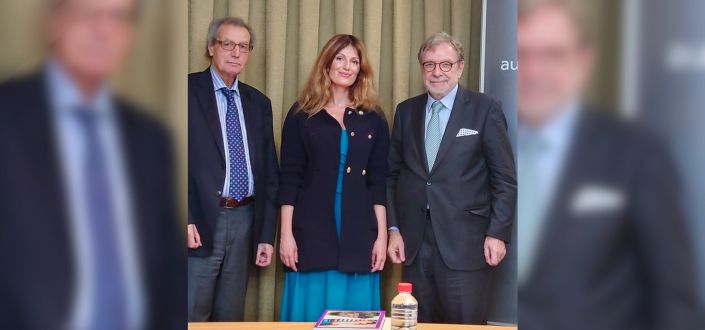The Ateneo de Santander hosted the presentation of the latest book by journalist and academic Juan Luis Cebrián, El efecto Sánchez. Ética y política en la era de la postverdad, in an event that packed the Assembly Hall of the Ateneo with attendees interested in reflecting on the challenges of democracy and the role of the media in the current political context.
Cebrián, founder and first director of the newspaper El País and member of the Royal Spanish Academy, shared with the audience the keys to this new publication that compiles a selection of articles published between 2018 and 2024.
Cebrián has been considered by various international media as one of the ten most influential Spaniards in Spain and Latin America for 42 years (from 1976 to 2018). He is the only Hispanic academic member of the Bilderberg Group and the only Spanish-speaking member with executive functions in it.
During his speech, the author expressed his concern about the political and institutional drift that, in his opinion, Spain and other Western democracies are going through. He was accompanied by Manuel Ángel Castañeda, President of the Ateneo and Julio Rama, Academician of the Royal Academy of Medicine of Cantabria.
Drawing on his more than 60 years of experience in journalism, the author defended the need to recover a politics based on pacts, transparency and respect for democratic principles. He stressed the importance of protecting the independence of the press and the courts from the excesses of the executive, as well as strengthening the autonomy of Parliament as a pillar of the democratic system. He also drew a parallel between Pedro Sánchez and Donald Trump, stating that both leaders share a way of doing politics that prioritises media control and the manipulation of discourse over institutional consensus.
The presentation of the book was attended by Dr. Silvia Aparicio, Vice-Rector for Academic Organisation and Teaching Staff at the Universidad Europea del Atlántico (European University of the Atlantic, UNEATLANTICO) , who took an active part in the subsequent colloquium, raising a fundamental question about the role of the media: ‘Shouldn’t the media pay more attention to essential issues such as the management of public money or the economic situation of the country, instead of focusing on corruption scandals which, although important, should not monopolise the public debate? His reflection opened an interesting dialogue on the responsibility of journalists in a democratic society and the role they play in the formation of a critical and well-informed citizenry.
Cebrián answered this and other questions with clarity, reiterating that the role of the media should not be to fuel tension, but rather to contribute to a free and educated public opinion. In this sense, he defended the value of traditional journalism, of paper and in-depth analysis, as opposed to the constant noise of social networks and the dictatorship of the flashy headline.
With this participation, UNEATLANTICO reinforces its commitment to public debate, critical reflection and the dissemination of thought. The presence of its vice-chancellor in events of this calibre reflects the academic will to be present in the most relevant forums of the cultural, political and social life of Cantabria, as well as to actively contribute to the formation of a conscious, informed and committed citizenship with democratic values.
Finally, it is worth mentioning that, with the aim of contributing to society in the area of communication, UNEATLANTICO offers degrees in Audiovisual Communication (CA), Journalism (PER), and Advertising and Public Relations (PRP).


